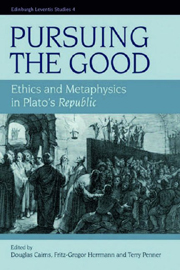Book contents
- Frontmatter
- Contents
- Preface
- Contributors and Editors
- Introduction
- 1 What is the Form of the Good the Form of? A Question about the Plot of the Republic
- 2 Glaucon's Challenge, Rational Egoism and Ordinary Morality
- 3 Thrasymachean Rulers, Altruistic Rulers and Socratic Rulers
- 4 Neutralism in Book I of the Republic
- 5 The Good, Advantage, Happiness and the Form of the Good: How Continuous with Socratic Ethics is Platonic Ethics?
- 6 The Form of the Good and the Good in Plato's Republic
- 7 Flourishing: The Central Concept of Practical Thought
- 8 Is Plato's Conception of the Form of the Good Contradictory?
- 9 The Good, Essences and Relations
- 10 The Idea of the Good and the Other Forms in Plato's Republic
- 11 The Aporia in the Charmides about Reflexive Knowledge and the Contribution to its Solution in the Sun Analogy of the Republic
- 12 The Good and Mathematics
- 13 The Good and Order: Does the Republic Display an Analogy Between a Science of Ethics and Mathematics?
- 14 Inquiry and Justification in the Search for the Highest Good in Plato and Aristotle
- 15 The Carpenter and the Good
- 16 Conversion or Conversation? A Note on Plato's Philosophical Methods
- Index
3 - Thrasymachean Rulers, Altruistic Rulers and Socratic Rulers
Published online by Cambridge University Press: 12 September 2012
- Frontmatter
- Contents
- Preface
- Contributors and Editors
- Introduction
- 1 What is the Form of the Good the Form of? A Question about the Plot of the Republic
- 2 Glaucon's Challenge, Rational Egoism and Ordinary Morality
- 3 Thrasymachean Rulers, Altruistic Rulers and Socratic Rulers
- 4 Neutralism in Book I of the Republic
- 5 The Good, Advantage, Happiness and the Form of the Good: How Continuous with Socratic Ethics is Platonic Ethics?
- 6 The Form of the Good and the Good in Plato's Republic
- 7 Flourishing: The Central Concept of Practical Thought
- 8 Is Plato's Conception of the Form of the Good Contradictory?
- 9 The Good, Essences and Relations
- 10 The Idea of the Good and the Other Forms in Plato's Republic
- 11 The Aporia in the Charmides about Reflexive Knowledge and the Contribution to its Solution in the Sun Analogy of the Republic
- 12 The Good and Mathematics
- 13 The Good and Order: Does the Republic Display an Analogy Between a Science of Ethics and Mathematics?
- 14 Inquiry and Justification in the Search for the Highest Good in Plato and Aristotle
- 15 The Carpenter and the Good
- 16 Conversion or Conversation? A Note on Plato's Philosophical Methods
- Index
Summary
INTRODUCTION
Let me begin with an account of the three conceptions of rulers mentioned in the title of my chapter.
A Thrasymachean ruler (TR) is a ruler (a) who seeks his own benefit in ruling by taking advantage of the subject and (b) who, in virtue of his expertise of ruling, never errs in his pursuit of the aim of the ruling craft, which is to secure what is beneficial to the ruler by taking advantage of the subject.
An Altruistic ruler (AR) is a ruler (a) who seeks the benefit of his subject in ruling without regard to his own benefit and (b) who, in virtue of his expertise of ruling, never errs in his pursuit of the aim of the ruling craft, which is to secure what is beneficial to the subject without regard to the ruler's own benefit.
A Socratic ruler (SR) is an expert ruler (a) who seeks his own benefit in ruling and (b) who rules by pursuing the aim of the ruling craft, which is to command what is beneficial to the subject without regard to the ruler's own benefit.
As I see it, the crucial difference between a Thrasymachean ruler and an Altruistic ruler has to do with a ruler's psychological motive in ruling. While a Thrasymachean ruler is psychologically motivated to rule by his desire for his own benefit, an Altruistic ruler is motivated by his desire for the benefit of others. The two rulers differ further in the way each conceives of the goal of the ruling craft. Each takes the goal of the ruling craft to coincide exactly with his personal motive in ruling.
- Type
- Chapter
- Information
- Pursuing the GoodEthics and Metaphysics in Plato's Republic, pp. 61 - 75Publisher: Edinburgh University PressPrint publication year: 2007



